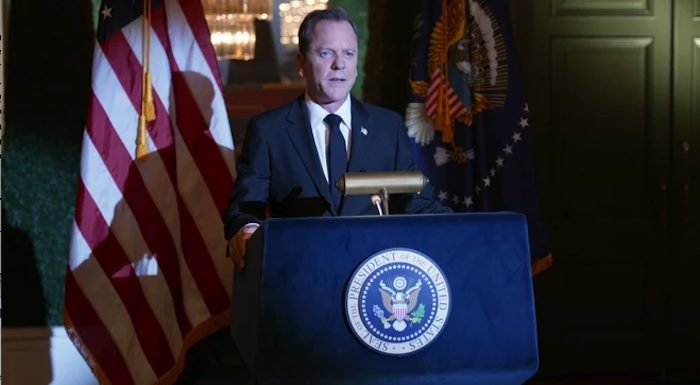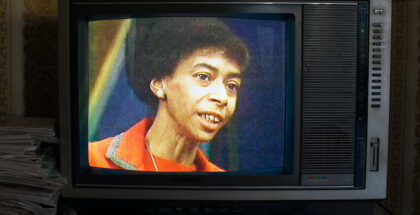Designated Survivor: Escapist nonsense and all the better for it (spoilers)
Review Overview
Cast
7Conspiracy
6Pace
8David Farnor | On 19, Feb 2017
Warning: this contains spoilers. Not caught up with Designated Survivor? Read our spoiler-free review of Episode 1 here.
A man not qualified to be US President suddenly finds himself sworn in as POTUS. That’s the premise behind Designated Survivor, starring Kiefer Sutherland, and it immediately brings to mind the Donald Trump presidency currently unfolding in real life. By the time we reach Episode 6 in the series, Sutherland’s Kirkman is faced with a challenging decision: get the governors of all the different States on his side by agreeing with them about what to do with a plane full of Syrian refugees waiting to land in Florida, or overrule them and isolate himself even further from the political establishment – a major obstacle to him rebuilding the country’s government after the attack on the Capitol. The governors’ proposal? Temporarily suspend immigration altogether. From everywhere. But while you might think the series is about to take a wild lurch into satirical commentary, Designated Survivor soon swings back into more ridiculous escapism – and it’s all the better for it.
Kirkman, of course, does agree to the temporary ban, and it’s a mark of how much the show is actually trying to develop his character; Episodes 1 to 5 saw the naive POTUS repeatedly fall back on his morals to overcome the hurdles in his path to success, but Episodes 6 to 10 see him begin to compromise to get ahead. In other words, he’s becoming a politician.
The series remains relentlessly ridiculous, but Episode 6 is a reminder of just how well crafted some parts of the show can be. While Nassar is being interrogated by the secret service, Kirkman agrees to be grilled by the governors in a sort-of belated job interview. Who set Nassar up and was really behind the bombing? What’s Kirkman’s favourite colour? It’s hardly a subtle back-and-forth, but it’s effective, giving the show a pace that recalls the forgiving breakneck style of 24. And, of course, it gives Kiefer the chance to flounce out of the room saying things like “Maybe I shouldn’t be president!” – because, you know, acting.
Episode 7 gives him the chance to continue being more political, as he attempts to negotiate a three-way spy trade with Saudi Arabia and Russia to get back a sportsman arrested by the FSB – only to discover that the sporting hero is a mole for Russia anyway. After The West Wing and House of Cards, it’s not often we get to see a President on TV screw things so incompetently. Well, not outside of the news, anyway.
The show’s B plot – Maggie Q’s FBI agent Hannah Wells investigating the bombing – initially felt like the programme’s weak spot, struggling to come across as relevant to the action, but the final five episodes of Season 1’s first half do a solid job of tying them closer together. The more she suspects Congressman MacLeish of being involved somehow (after that discovery of him being moved to a secret bomb shelter in Congress), for example, the more time we spend with MacLeish and his wife.
Ashley Zukerman is wonderfully slippery as the Congressman, thanks to his sheer photogenic sheen. (“He even looks like JFK!” Hannah exclaims at one point.) Lara Jean Chorostecki as his wife, Beth, meanwhile, emerges as an increasingly formidable Lady Macbeth figure. They’re both incredibly smooth and charming when they have dinner with Kirkman and his wife (Natascha McElhone), which, of course, only makes them more suspicious.
But the truth must out – and Hannah’s digging begins to reveal the big picture. Nassar gives her and Deputy Director Atwood (an enjoyably intense Malik Yoba) the name “Catalan”, which leads them to a mercenary who was on a mission with MacLeish back in his army days – a covert operation that went horrible wrong and saw MacLeish shoot his way through several villages. “He’s not a war hero. He’s a war criminal,” exclaims Hannah.
Maggie Q does sterling work, not just at delivering some of the worst lines of dialogue imaginable. While an entire subplot surrounding Atwood being forced into pretending he was responsible for Nassar’s death-by-poisoning (while in FBI custody) is a wonky piece of padding, it’s Maggie’s half of the show that actually ends up the more compelling, largely thanks to her conviction in the role.
Just as Maggie gets a welcome amount to do, McElhone enjoys an impressive amount of screentime, as the script uses her attorney experience as an excuse to throw her into the most heated political discussions available – and, at the same time, wisely tones down the soapy elements related to the Kirkman family. The only domestic drama we get now is the issue of Leo’s (Tanner Buchanan) paternity, which is solved through a rapid DNA test and is also kept firmly tied to the main theme: the PR problems facing Kirkman and his team.
Mentioning PR, of course, means a shout-out to Kal Penn as Press Secretary Seth, who fields journalists’ questions with a wit that makes Sean Spicer look like, well, Sean Spicer. The show neatly keeps us on his side of the fence, so every time a reporter raises their hand, there’s a risk that they’ll unveil something he doesn’t know about, or something the White House is trying to keep quiet. Add in a brief romantic dalliance with tenacious reporter Lisa Jordan (Melanie Scrofano) and Penn’s character, who could easily be a token background figure, swiftly becomes a firm favourite. (The only shame is that this means less screen-time for Virginia Madsen’s Congresswoman Hookstraten, who becomes less and less relevant, as Season 1’s conspiracy unravels.)
There’s gentle chemistry, too, between Kirman’s Chief of Staff, Aaron (Adan Canto), and Special Advisor Emily (Italia Ricci), which serves the double purpose of making their narrative-driving scenes more entertaining to watch and making Episode 10’s reveal about Aaron all the more surprising.
Because yes, Hannah works out that there’s a mole in the White House, a theory confirmed by the hard drive that Kirkman gets hold of from a former NSA employee who turns whistleblower. On the drive? An exact blueprint plan for the Capitol bombing – one that was war-roomed out by the NSA years ago. The show, rather pleasingly, brings back General Cochrane from earlier in the season for a brief confrontation over the cover-up, and his comments mean it’s only a matter of time until Emily traces the person responsible for burying the file: ex-Chief of Staff Charles Langdon. His assistant? You guessed it: Aaron.
Let’s backtrack slightly. Aaron, not unlike MacLeish, is a character who has been impeccably turned-out all season so far – and everyone knows that when Kiefer Sutherland is your lead actor, the only person on-screen with a chiselled chin you should trust is Kiefer Sutherland. Aaron, though, has also done the odd dodgy act, such as leaking that Nassar tape when Kirkman said not to. He’s also been very keen to push MacLeish through to being VP without full FBI vetting.
Catalan, meanwhile, has apparently been behind the whole thing all along, working with Langdon to make sure that Kirkman survived the Capital attack, that Nassar would be framed for it, and that MacLeish would also be alive as the perfect VP candidate – and that Catalan himself would be waiting, ready, to snipe Kirkman in the head at MacLeish’s swearing in. (Pro tip: Don’t think about it too much and it almost holds together.)
But he figures without Hannah, and it’s in the final episodes that Maggie’s agent really shines. Using her strengths as an action star more and more, Episode 10 essentially turns into one long chase scene, as Hannah fights her way to the Capitol in time to stop the sniper – a journey that involves car crashes (the breathtaking cliffhanger for Episode 9), breaking into the apartment of her loyal FBI sidekick, Chuck, shooting people, finding Langdon in the Virginia woods, and then stumbling, bleeding, through Washington crowds. It’s absurd, but viscerally gripping, thanks to Maggie’s unwavering commitment; handheld cameras, as opposed to the steady, composed shots of the White House, give everything a momentum that feels like the world’s most over-the-top video game.
And so, at the midseason break, we end up right back where we were at the season’s premiere: an assassination at a presidential inauguration. Once again, it puts Designated closer to 24 than Veep – right down to the fact that it leaves us not knowing whether the plan to shoot Kirkman has been successful (Designated Survivor returns in March). Despite the fact that Season 1 has toyed with shootings, bio-terrorist attacks on polls, whistleblowers and other issues seemingly torn from the headlines, Episode 10 revels in the series’ escapist nonsense. And with Trump’s White House reign becoming more surreal and unsettling (and frequently beyond satire), there’s a lot to be said for escapist nonsense right now.
Designated Survivor is available on Netflix UK, as part of an £9.99 monthly subscription. New episodes arrive every Thursday, within 24 hours of their US premiere.





















